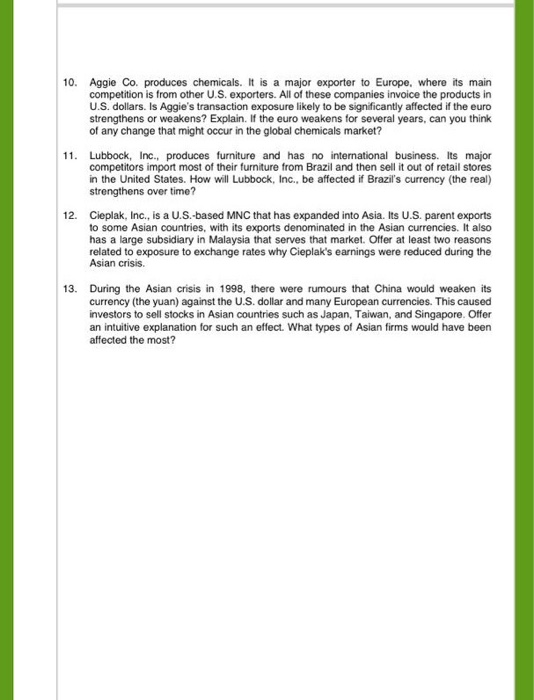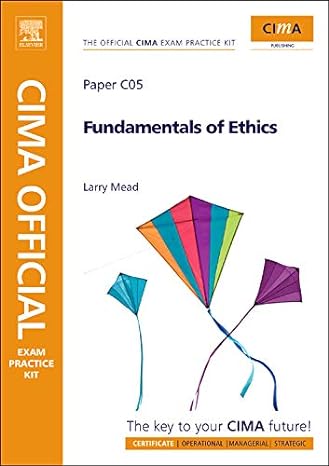10. Aggie Co. produces chemicals. It is a major exporter to Europe, where its main competition is from other U.S. exporters. All of these companies invoice the products in U.S. dollars. Is Aggie's transaction exposure likely to be significantly affected if the euro strengthens or weakens? Explain. If the euro weakens for several years, can you think of any change that might occur in the global chemicals market? 11. Lubbock, Inc., produces furniture and has no international business. Its major competitors import most of their furniture from Brazil and then sell it out of retail stores in the United States. How will Lubbock, Inc., be affected if Brazil's currency (the real) strengthens over time? 12. Cieplak, Inc., is a U.S.-based MNC that has expanded into Asia. Its U.S. parent exports to some Asian countries, with its exports denominated in the Asian currencies. It also has a large subsidiary in Malaysia that serves that market. Offer at least two reasons related to exposure to exchange rates why Cieplak's earnings were reduced during the Asian crisis. 13. During the Asian crisis in 1998, there were rumours that China would weaken its currency (the yuan) against the U.S. dollar and many European currencies. This caused investors to sell stocks in Asian countries such as Japan, Taiwan, and Singapore. Offer an intuitive explanation for such an effect. What types of Asian firms would have been affected the most? 10. Aggie Co. produces chemicals. It is a major exporter to Europe, where its main competition is from other U.S. exporters. All of these companies invoice the products in U.S. dollars. Is Aggie's transaction exposure likely to be significantly affected if the euro strengthens or weakens? Explain. If the euro weakens for several years, can you think of any change that might occur in the global chemicals market? 11. Lubbock, Inc., produces furniture and has no international business. Its major competitors import most of their furniture from Brazil and then sell it out of retail stores in the United States. How will Lubbock, Inc., be affected if Brazil's currency (the real) strengthens over time? 12. Cieplak, Inc., is a U.S.-based MNC that has expanded into Asia. Its U.S. parent exports to some Asian countries, with its exports denominated in the Asian currencies. It also has a large subsidiary in Malaysia that serves that market. Offer at least two reasons related to exposure to exchange rates why Cieplak's earnings were reduced during the Asian crisis. 13. During the Asian crisis in 1998, there were rumours that China would weaken its currency (the yuan) against the U.S. dollar and many European currencies. This caused investors to sell stocks in Asian countries such as Japan, Taiwan, and Singapore. Offer an intuitive explanation for such an effect. What types of Asian firms would have been affected the most







